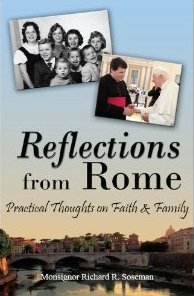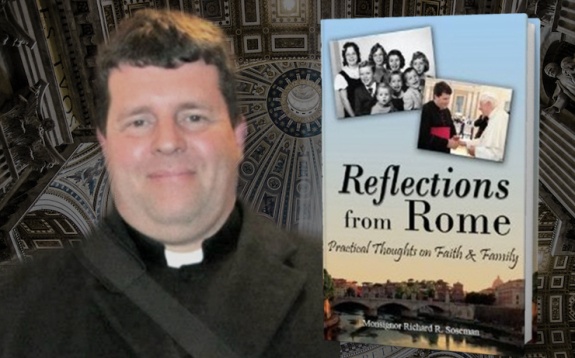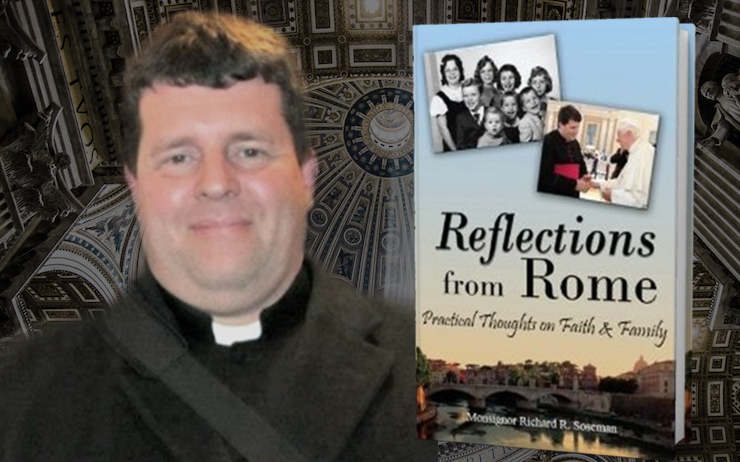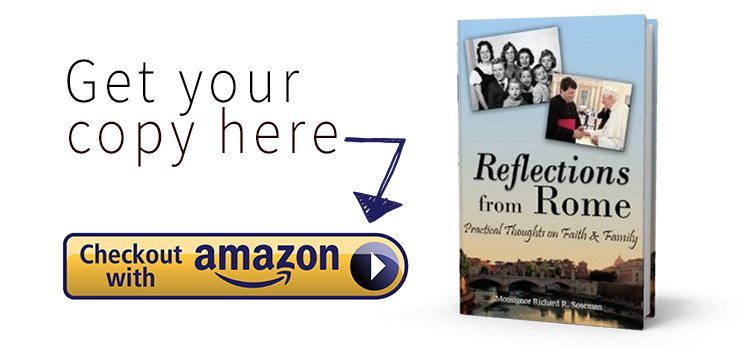George Bernanos’ Diary of a Country Priest has become a Catholic classic, and rightfully so, for its moving account a young French priest who experiences deep struggle, joy, and wonder through his service of a country people.
Thanks to Monsignor Richard Soseman, we now have a similar glimpse at the life of different sort of priest. His new memoir, Reflections from Rome: Practical Thoughts on Faith and Family, takes us from the fields of Princeville, Illinois to the majestic splendor of Rome, revealing the comings and goings of life as a priest in the Eternal City.
Msgr. Soseman currently serves as an Official for the Congregation for the Clergy and is also Judge for the Cause of Venerable Fulton Sheen. He recently chatted with me about his upbringing, his life in Rome, and his prolific blogging.
BRANDON: In Reflections from Rome, you share many uplifting anecdotes about your family. How has your family supported your vocation to the priesthood?
MSGR. RICHARD SOSEMAN: When a couple marries they each bring the best of their own families, their background, gifts and talents, and life experience, to make to each other, and to their eventual children, a sincere gift of self.
My father was a man of great faith. He put this faith into action by his commitment of time and money to good causes. He was a very talkative man, who would listen to anyone. When he disagreed with someone, he did so in a pleasant, positive way. We used to think we were a very helpful family, because long after parish dinners and events, we would be there sweeping up and putting away tables and chairs. I realized as an adult, that probably, all the while, Dad was talking, so we kids found things to do in the meantime.
 My mother is more quiet, but very wise, and she, to this day, loves children. She was on the point of entering the Benedictine nuns years ago, when her father refused, saying she loved children too much. I was the youngest of 8, and there were very few moments in our lives when there was not some activity which would help us grow and develop, some constructive play activity, or even gardening, which had the practical side effect, too, of helping to feed 10 mouths through the year.
My mother is more quiet, but very wise, and she, to this day, loves children. She was on the point of entering the Benedictine nuns years ago, when her father refused, saying she loved children too much. I was the youngest of 8, and there were very few moments in our lives when there was not some activity which would help us grow and develop, some constructive play activity, or even gardening, which had the practical side effect, too, of helping to feed 10 mouths through the year.
We were also a devout family, with Mass attendance on Sunday, and sometimes during the week, and occasions of family devotions such as the Rosary. Each morning we prayed the Morning Offering as we prepared for school, and shows such as the early morning Sacred Heart program were often on television. On May 1st we would make May Baskets to hang, secretly, on the doors of neighbor ladies, and would build a May Altar where we could pray in the home during the month of Mary. I also remember some Rosary devotions during October.
My parents were also much given to community service, and I would often be taken along with my father, even as a small boy, to his meetings. Dad was a precinct committeeman and member of the Welfare Board when I was very small, part of our Youth Center Board, a blood donor, who also collected for the Heart, and Lung, Associations. Mom became a visiting nurse when I was in grade school, and would sometimes take me along while she looked in on her old people. Her insistence, I remember, was always that we learn to do things on our own, so we could do them as adults. So when my brother or I wanted chocolate chip cookies, we asked if we could make some. When filling out financial aid forms for college, we did that, asking our parents for the figures, of course.
I suppose this is a long way of saying that the family is the seedbed of vocations, and many vocations spring from normal, healthy, devout families and the family experiences young men and women have. As I was growing, I knew that priesthood was a possibility, but I also knew being a good layman was a possibility. When I decided to look into the possibility of seminary, of a vocation, my parents were supportive that I discover a vocation, or whatever else God might have in store. As a priest, I am supported in very powerful ways by the prayers and encouragement of each of my brothers and sisters, nieces and nephews, and they can still straighten me out if I am perceived to need a “talking to.” So, this ongoing support in living out my vocation is also important and helpful.
BRANDON: As a priest, you began your ministry in Princeville, Illinois, a small rural town. What were some of your most memorable experiences??
MSGR. SOSEMAN: When I was ordained, my first assignment was at St. Mary’s in Moline, Illinois, quite close to home. After a few months, I was left alone at the parish, and needed to run things for the rest of that year. People were kind, encouraging and supportive. It was there that I learned that a priest needs to be available to people. St. Mary’s is an old parish, with a large immigrant presence. It was inspiration to see the great example of our senior citizens. Two elderly gentlemen would set up for and serve Mass every morning, and taught me about as much as they learned from me. The “Heavenly Dusters” would gather in Church early every Friday, long before the morning Mass, and clean EVERYTHING, even all of the holy water stoups. They loved our Lord, they loved their church, and they came together each week to make sure that it was immaculate for Sunday Mass.
Six years after ordination, I was named pastor of St. Mary of the Woods Parish in Princeville, Illinois, a small town halfway between Peoria and Kewanee, Illinois. Six months after I arrived, I was incapacitated by an accident, and confined to a wheelchair. I learned then the overwhelming generosity of people when they are called upon to help. My mother came to stay with me and to care for me, parishioners would bring suppers every night of the week, always their specialties, and also would come by two or three times a day to help me move around the house. A wheelchair ramp was installed overnight. At Mass times, I would be loaded into a wheelchair and wheeled over to Church for Confessions or Mass. It was moving to see the devotion that our people had for the priesthood, and this poor priest. I should add that throughout my ten years there, I worked hard at explaining my vision for the parish, and the people were always very supportive. I also had several other irons in the fire, serving most of that time as Judicial Vicar and Judge of the Sheen Cause, but the people never complained about any of my absences from the parish to do this “other work” which was given to me.
Living in the country provided some unique experiences. I was able to hop on my bicycle, and be out on the many country roads in a matter of minutes. I discovered the quiet beauty of the fields at different times of the year, of sunrise over the prairie and of the woodland birds and flowers. September was interesting, for there was a pasture within “hearing” distance of the rectory, and in September the calves were weaned from the cows. My goodness, what a racket, day and night, for a few days. The shut-ins I would visit would often give some worldly wisdom, built up from long experience, from topics as how to properly wean calves so they don’t make such a racket, insights into others whom they had known for a lifetime, and beautiful reflections about God’s actions in their lives over the years. God is so good.
We would have adoration of the Blessed Sacrament, throughout the day, on many first Saturdays. Attendance could be a bit spotty. One month, for a special occasion, we decided to have overnight adoration from Friday through Saturday morning. I remember going over for prayer at 3 a.m., and 10 people were there! It turns out that Saturday, daytime, was often the time for running weekly errands, for “going to town,” for groceries and supplies, etc., while overnight was much more convenient for many parishioners. There was so much to learn.
One hears so much about these “mega churches,” amongst the Protestants and seekers, and some dioceses are reorganized to merge parishes into new “mega parishes” which they hope might provide many services. This type of thrust overlooks the great goodness which is part of rural parish, or other small parish life. I can say that my parish experience in Princeville, a rural parish, made me a better priest.
BRANDON: You later moved to Rome to begin work with the Congregation for the Clergy. How has the Eternal City shaped your spiritual life?
MSGR. SOSEMAN: Of course, it is an experience almost beyond description to live in a city shaped by so many martyrs and saints over the centuries. It is wonderful to be able to read about the different churches and other sites in the city of Rome, and then to visit those places, knowledgeable of those who have pioneered the faith here and throughout the world.
For the last few years I have been celebrating Holy Mass daily at St. Peter’s Basilica. To be in the center of our faith every day for early morning Mass is a very moving experience. For a few years I have let online friends, family, and contacts, know that I would be remembering their prayer requests at Holy Mass at St. Peter’s on Fridays. Each week I receive an outpouring of prayer requests, some weeks more than 100. Ven. Fulton Sheen said that when a priest approaches the altar, all of his parishioners are dangling from his vestments. I have come to this realization most fully as I read through these requests for prayers every Thursday night and Friday morning in preparation for Mass, and then again call them to mind during the Mass.
BRANDON: One thing I appreciate in your reflections is your emphasis on finding God in the ordinary. How can we do that better?
MSGR. SOSEMAN: I was once invited to moderate one meeting of a charismatic prayer group online, in the early years of the internet. We got into a discussion of St. Thérèse, the Little Flower’s practice of “doing the ordinary, extraordinarily well,” as a way to follow Jesus’ footsteps, and what that would mean in everyday life. A mother who was participating typed in something like “when I bring my son his bowl of cereal in the morning, I could just put it on the table in front of him, or I could put it in front of him and lean over and kiss him on the forehead,” and she asked if that would be an example. “Certainly,” the reply came. Our Lord has given us each unique gifts and talents, and as we strive to stay close to him throughout the day, we try to put those to the best use. So, a mother excelling in some small way with her children, a mechanic who avoids swearing when he mashes his hand, an artist who makes just the right brush stroke, and looks up and says “thank you Lord,” these are all ways in which we can find God in the ordinary.
We must never forget the four ends of prayer. We are all familiar with petition, asking God for things, but we often forget thanksgiving, thanking him for what he has given to us. Most of us do that at grace at mealtimes, but anytime during the day we accomplish something unexpected, we can certainly thank our Lord. We can also, so often during the day, make reparation to our Lord. By this third end of prayer we strive to offer ourselves to God to try to make up for our own sins and the sins of others. This can be done through the day by praying the Divine Praises, or by pious sayings or ejaculations, perhaps one of the lines from the Divine Praises or even “My Jesus, mercy!” Our penances can also be offered in reparation. St. Francis de Sales encouraged us to do little penances throughout the day which no one would notice, like giving up salting a food at a meal. Small, daily actions of love like this can be offered as prayers of reparation. The final end of prayer, of course, is adoration, kneeling before the mystery of God in prayers, placing ourselves in his hands, realizing his majesty, and our utter dependence upon him. We should try to do this more often.
Our lives are so different, it is hard to come up with a one size fits all answer, but these, hopefully, will start the reader thinking in the right direction!
BRANDON: Many of these reflections are adapted from blog posts you made. Why did you start blogging? Do you recommend other priests start blogs of their own?
MSGR. SOSEMAN: When secular writers write about faith, it is usually that it is diminishing, that fewer people are going to Church, for instance, or that only megachurches are growing because they are “with it.” Many people of more recent generations don’t have the building blocks to understand faith, they were never catechized fully, so they don’t even know how to begin. Others feel distanced or alienated from God and His Church because, in their humility, they feel unworthy to approach him. They believe that they are distant from him but don’t quite understand how. Some have bought into any of the hundreds of myths about the Church, which they hear and see every day in their use of the media. Still others may feel distanced because they understand the Church as being anti woman, homophobic, too political, or even worse. Some of us can even feel distant from the Church because of a bad experience with a priest, nun, or zealous lay person.
In my priesthood I have really seen that there is such hunger for the faith in the world, there is such a desire to know God, despite all of these barriers that have been set up by society, or by one’s own conscience. I believe I have always tried to get people to look beyond all of those barriers, trusting in the Holy Spirit to lead them through to a greater relationship with God. Blogging is just one way to do that. The reflections which I post are meant to catch people’s attention or interest, with some story from family life, the saints, Church history, or something humorous from Rome or home, and then relate that to an application in living the faith. I hope to help people to cut through their doubts, to overcome any barriers which might be in the way, to come closer to God.
Over the years I have also been involved in sports sites, and write essays for them too. Most of those are much less faith centered. On a cycling site I publish daily essays during the Tour de France and other Grand Tours. These deal with the history, culture, or literature of that portion of Spain, or France, or Italy, through which the race is passing that day, or occasionally food or wine. I am conscious not to avoid mention of faith, of course, as I am who I am through the grace of God. Recently, the moderators of the site put up a post from a gentleman saying that through my daily essays on cycling, he had come back to the Church of his childhood (he then went on to credit Pope Francis, too).
So, I have some talents in writing, I have some time I can dedicate to it, and I want to use this writing for the greater glory of God and the salvation of souls.
I would encourage any priest, any time, anywhere, to use the modern media in his own ministry. The need is so great! A good friend and diocesan brother priest of mine has a parishioner who asked if she could record his sermons, and now those are posted online. The twelve apostles were chosen by Our Lord because of their strengths, but also because of their weakness, because they were able to reach out to others in their own unique ways. Some priests are bookish, some have quick tempers or great senses of humor, some are known for being more strict, others for loving sports or fine foods and wine. All these faithful priests have tools whose uniqueness means can reach unique people.
So, in addition to the wonderful and fruitful efforts of the laity to spread the faith using the new media, I pray many priests will become involved, employing their own gifts and talents and reaching out to the souls that they can reach best.



